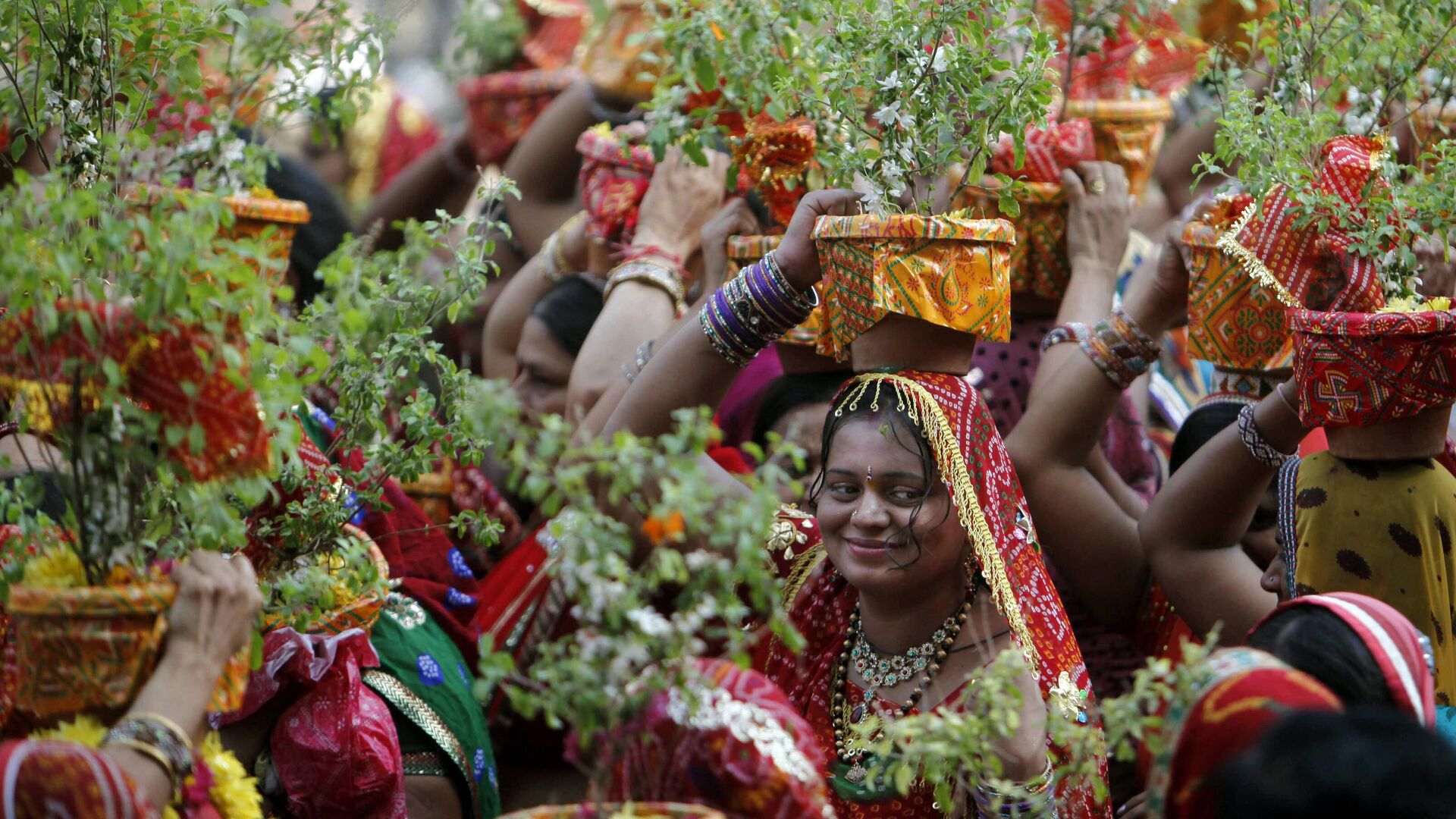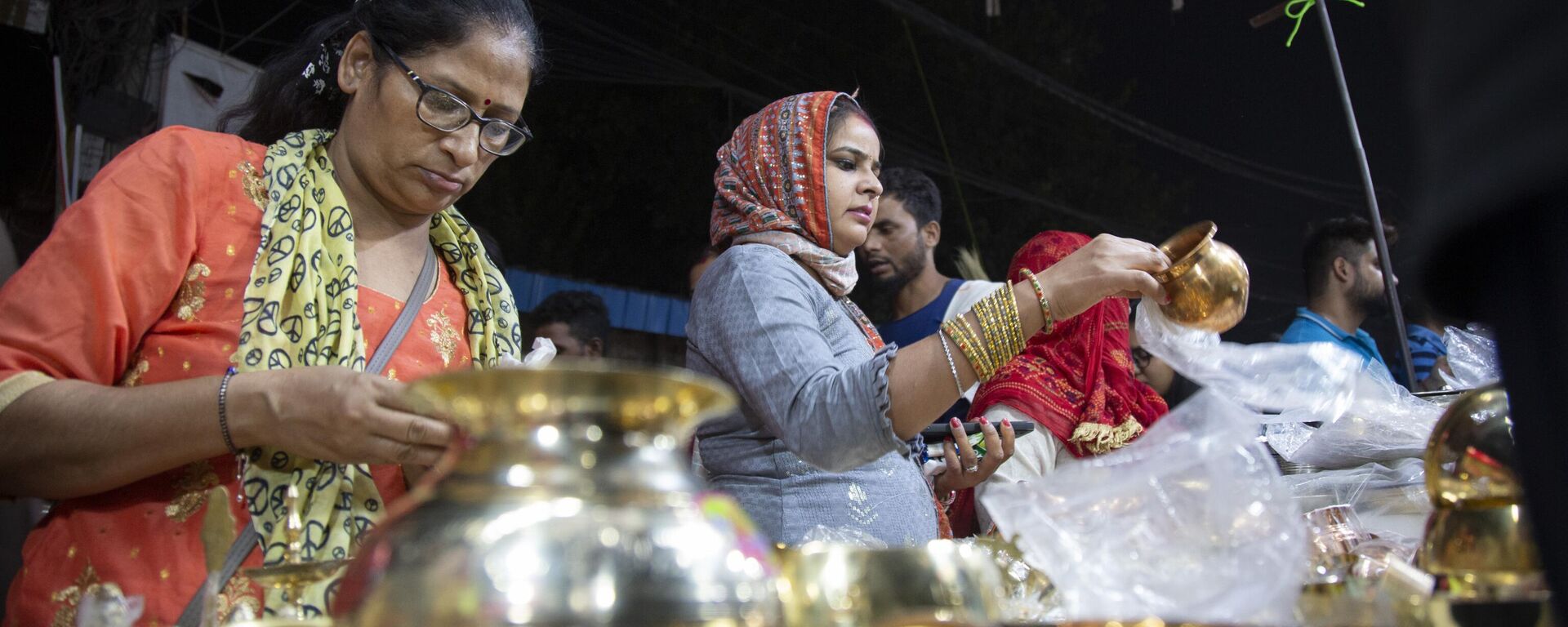https://sputniknews.in/20231123/tulsi-vivah-how-to-celebrate-sacred-marriage-of-goddess-tulsi-lord-vishnu-5548811.html
Tulsi Vivah: How to Celebrate Sacred Marriage of Goddess Tulsi, Lord Vishnu
Tulsi Vivah: How to Celebrate Sacred Marriage of Goddess Tulsi, Lord Vishnu
Sputnik India
Hindu devotees across India are immersed in the grand celebration of Tulsi Vivah, a significant Hindu festival that celebrates the marriage of sacred Tulsi plant and Lord Shaligram.
2023-11-23T20:30+0530
2023-11-23T20:30+0530
2023-11-23T20:32+0530
india
hindu festival
maharashtra
uttar pradesh
lord shiva
hindu
hindu deities
hindu marriage
hindu devotees
hindu shrine
https://cdn1.img.sputniknews.in/img/07e7/0b/17/5557225_0:122:3210:1928_1920x0_80_0_0_6a6bfc8fb71e8cc49118e6d8b97613d7.jpg
Temples all over India are beautifully adorned as devotees come together to celebrate the Tulsi Vivah festival by enacting the sacred wedding ceremony between the revered Tulsi plant, symbolizing the goddess Tulsi, and the divine Lord Shaligram, a manifestation of Lord Vishnu.The Tulsi plant, which is worshipped widely as a form of the goddess Tulsi, is present in most Hindu homes and considered to be a symbol of purity with great medicinal properties.Shubh Muhurat (Auspicious Time) for Tulsi Vivah Puja CeremonyAccording to the Drik Panchang (Hindu calendar), the muhurat of Tulsi Vivah collides with Dwadashi tithi, which starts on Thursday, 23 November at 9:01 PM (IST) and ends on 24 November at 7:06 PM.The auspicious time for Tulsi Vivah is from 6:50 AM to 12:07 PM on November 24.Significance of Tulsi VivahThe celebration of Tulsi Vivah is of immense importance, as devotees worship the deities in hopes of finding an ideal life partner and receiving blessings for those who have struggled to conceive.Many weddings take place on this day, as the festival marks the beginning of the marriage season in Hindu culture and is considered highly auspicious.According to tradition, the woman of the family, in the morning, waters the Tulsi plant in their home, and in the evening, lights a lamp (diya) and an incense stick.Story Behind Tulsi VivahAccording to Hindu belief, the history of Tulsi Vivah is associated with a pious and religious woman, Vrinda, who was married to a demon king named Jalandhar.Jalandhar, who was a great devotee of Lord Shiva, was blessed with a special power making him invincible as long as his wife remained faithful to him.The demon king misused his powers and waged a war against the demigods.Desperate to defeat Jalandhara, Lord Vishnu disguised himself as Jalandhara and tricked Vrinda into breaking her chastity.After learning the truth, the furious Vrinda cursed Vishnu and turned him into a stone (Shaligram).In reverence to Vrinda's devotion, Lord Vishnu declared that he would marry her in her next birth, which prompted the Tulsi Vivah festival.Tulsi Vivah is celebrated with great zeal and enthusiasm by devotees across India, especially in the states of Maharashtra, Uttar Pradesh, Gujarat, and Rajasthan.Here are a few ways you can celebrate Tulsi Vivah:The marriage rituals include exchanging garlands, applying vermilion (sindoor) on Tulsi's leaves, and tying a sacred thread (mangalsutra) around the plant.Devotees offer prayers, light incense sticks, and sing devotional songs in praise of the deities.Some organize kirtan and bhajans, recite vedic mantras, and chant the goddess Tulsi Aarti and Lord Vishnu Aarti.Fasting: Many devotees observe a fast during Tulsi Vivah as a mark of devotion and purification. Some fast for the entire day, consuming only fruit and milk, while others follow a partial fast, abstaining from certain foods. Fasting on this day is believed to bring good luck, prosperity, and blessings from the divine couple.Charity and Good Deeds: Tulsi Vivah is an ideal time to engage in acts of charity and benevolence. Devotees donate food, clothes, or money to the needy, reinforcing the importance of selflessness and caring for others. Additionally, volunteering at temples or organizing community activities fosters a sense of collective celebration and joy.
https://sputniknews.in/20231108/dhanteras-interesting-stories-behind-why-hindus-celebrate-festival-of-wealth-5299931.html
india
maharashtra
uttar pradesh
Sputnik India
feedback.hindi@sputniknews.com
+74956456601
MIA „Rossiya Segodnya“
2023
Sangeeta Yadav
https://cdn1.img.sputniknews.in/img/07e6/0c/0f/110602_0:0:641:640_100x100_80_0_0_c298016a79eb02ef8caa9d1f688c12a5.jpg
Sangeeta Yadav
https://cdn1.img.sputniknews.in/img/07e6/0c/0f/110602_0:0:641:640_100x100_80_0_0_c298016a79eb02ef8caa9d1f688c12a5.jpg
News
en_IN
Sputnik India
feedback.hindi@sputniknews.com
+74956456601
MIA „Rossiya Segodnya“
Sputnik India
feedback.hindi@sputniknews.com
+74956456601
MIA „Rossiya Segodnya“
Sangeeta Yadav
https://cdn1.img.sputniknews.in/img/07e6/0c/0f/110602_0:0:641:640_100x100_80_0_0_c298016a79eb02ef8caa9d1f688c12a5.jpg
hindu devotees, tulsi vivah, hindu festival, sacred tulsi plant, lord shaligram, sacred wedding ceremony, lord vishnu, shubh muhurat, tulsi vivah puja, drik panchang, hindu calendar, muhurat, dwadashi tithi, significance of tulsi vivah, beginning of the marriage season in hindu culture, story behind tulsi vivah, hindu mythology, lord shiva, stone shaligram, maharashtra, uttar pradesh, gujarat, rajasthan, rangoli, kirtan, bhajans, mantras, chant goddess tulsi aarti, lord vishnu aarti, devotees observe fast, fasting, tulsi prasadam
hindu devotees, tulsi vivah, hindu festival, sacred tulsi plant, lord shaligram, sacred wedding ceremony, lord vishnu, shubh muhurat, tulsi vivah puja, drik panchang, hindu calendar, muhurat, dwadashi tithi, significance of tulsi vivah, beginning of the marriage season in hindu culture, story behind tulsi vivah, hindu mythology, lord shiva, stone shaligram, maharashtra, uttar pradesh, gujarat, rajasthan, rangoli, kirtan, bhajans, mantras, chant goddess tulsi aarti, lord vishnu aarti, devotees observe fast, fasting, tulsi prasadam
Tulsi Vivah: How to Celebrate Sacred Marriage of Goddess Tulsi, Lord Vishnu
20:30 23.11.2023 (Updated: 20:32 23.11.2023) Hindu devotees across India are immersed in the grand celebration of Tulsi Vivah, a significant festival that celebrates the marriage of the sacred Tulsi plant and Lord Shaligram.
Temples all over India are beautifully adorned as devotees come together to celebrate the Tulsi Vivah festival by enacting the sacred wedding ceremony between the revered Tulsi plant, symbolizing the goddess Tulsi, and the divine Lord Shaligram, a manifestation of Lord Vishnu.
The Tulsi plant, which is worshipped widely as a form of the goddess Tulsi, is present in most Hindu homes and considered to be a symbol of purity with great medicinal properties.
Shubh Muhurat (Auspicious Time) for Tulsi Vivah Puja Ceremony
According to the Drik Panchang (Hindu calendar), the muhurat of Tulsi Vivah collides with Dwadashi tithi, which starts on Thursday, 23 November at 9:01 PM (IST) and ends on 24 November at 7:06 PM.
The auspicious time for Tulsi Vivah is from 6:50 AM to 12:07 PM on November 24.
Significance of Tulsi Vivah
The celebration of Tulsi Vivah is of immense importance, as
devotees worship the deities in hopes of finding an ideal life partner and receiving blessings for those who have struggled to conceive.
Many weddings take place on this day, as the festival marks the beginning of the marriage season in Hindu culture and is considered highly auspicious.
According to tradition, the woman of the family, in the morning, waters the Tulsi plant in their home, and in the evening, lights a lamp (diya) and an incense stick.
According to Hindu belief, the history of Tulsi Vivah is associated with a pious and religious woman, Vrinda, who was married to a demon king named Jalandhar.
Jalandhar, who was a great
devotee of Lord Shiva, was blessed with a special power making him invincible as long as his wife remained faithful to him.
The demon king misused his powers and waged a war against the demigods.
Desperate to defeat Jalandhara, Lord Vishnu disguised himself as Jalandhara and tricked Vrinda into breaking her chastity.
After learning the truth, the furious Vrinda cursed Vishnu and turned him into a stone (Shaligram).
In reverence to Vrinda's devotion, Lord Vishnu declared that he would marry her in her next birth, which prompted the Tulsi Vivah festival.
Tulsi Vivah is celebrated with great zeal and enthusiasm by devotees across India, especially in the states of
Maharashtra,
Uttar Pradesh,
Gujarat, and
Rajasthan.
Here are a few ways you can celebrate Tulsi Vivah:
1.
Plant Tulsi: Devotees plant a Tulsi sapling in their home or garden. Prior to the festival, devotees clean and decorate the area around the Tulsi plant with rangoli (colorful patterns created using coloured powders), flowers, and lights. The sacred plant is an essential part of every Hindu household, as it is considered an auspicious symbol of prosperity and spiritual well-being.
2.
Perform Rituals: On the day of Tulsi Vivah, devotees commemorate the marriage ceremony of the goddess Tulsi and Lord Shaligram. The Tulsi is adorned as a bride in a saree or dupatta, while the Shaligram or Lord Vishnu represents the groom.
The marriage rituals include exchanging garlands, applying vermilion (sindoor) on Tulsi's leaves, and tying a sacred thread (mangalsutra) around the plant.
Devotees offer prayers, light incense sticks, and sing devotional songs in praise of the deities.
Some organize kirtan and bhajans, recite vedic mantras, and chant the goddess Tulsi Aarti and Lord Vishnu Aarti.
Fasting: Many devotees observe a fast during Tulsi Vivah as a mark of devotion and purification. Some fast for the entire day, consuming only fruit and milk, while others follow a partial fast, abstaining from certain foods. Fasting on this day is believed to bring good luck, prosperity, and blessings from the divine couple.
Charity and Good Deeds: Tulsi Vivah is an ideal time to engage in acts of charity and benevolence. Devotees donate food, clothes, or money to the needy, reinforcing the importance of selflessness and caring for others. Additionally, volunteering at temples or organizing community activities fosters a sense of collective celebration and joy.



